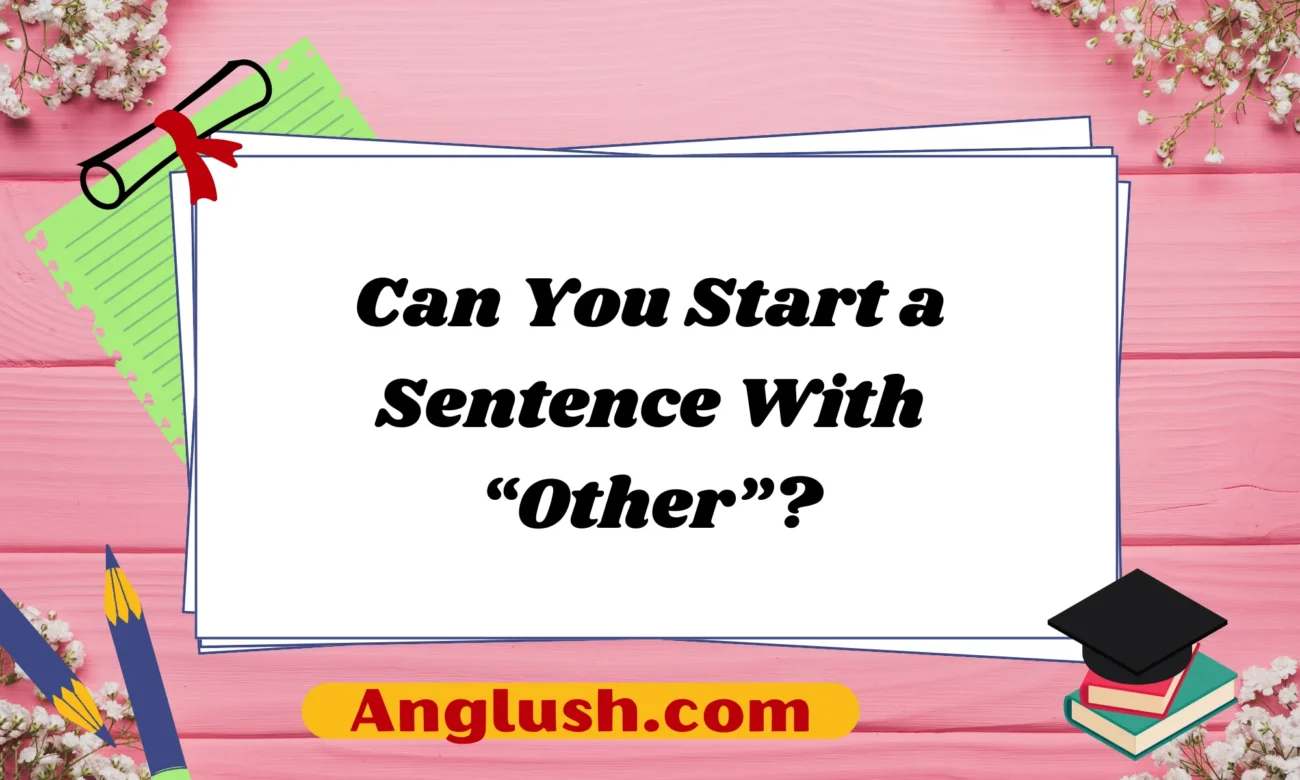The English language is full of flexibility and nuance, allowing for a wide range of sentence structures. One question that often arises is whether a sentence can start with the word “other.” While it may seem unconventional at first, it is entirely possible to begin a sentence with “other,” provided that it is grammatically sound and contextually appropriate.
This article will explore different ways “other” can be used at the beginning of a sentence, along with examples in formal, professional, and casual settings. We’ll also provide 11 user-friendly texting examples to help you incorporate variations of “other” into your written communication effectively.
Can You Begin a Sentence With “Other”?
Yes, you can start a sentence with “other” in English. However, for it to work grammatically, “other” must be followed by a noun or a phrase that provides clarity.
For example:
✅ Other options may be considered before making a final decision.
✅ Other than the weather, the event went as planned.
In these examples, “other” correctly functions as an adjective modifying a noun (“options”) or as part of a prepositional phrase (“Other than the weather”).
However, using “other” without a proper noun or phrase can create confusion:
❌ Other is not a good choice. (Incorrect—missing a clear subject)
Grammatical Considerations
When using “other” at the beginning of a sentence, ensure that:
- It modifies a noun (e.g., “Other ideas were discussed.”)
- It is part of a phrase (e.g., “Other than that, everything was fine.”)
- It is followed by a subject and verb (e.g., “Other students arrived early.”)
Alternatives to Starting a Sentence With “Other”
If you feel that starting with “other” makes your sentence sound awkward, you can use alternative phrases to convey the same idea. Below are several substitutes based on tone and formality.
1. Formal Alternatives
For professional or academic writing, consider these polished alternatives:
✅ Additionally, other options should be explored before making a decision.
✅ Besides this, there are additional aspects to consider.
✅ Alternatively, a different approach might be more effective.
✅ Moreover, further possibilities exist beyond what was initially considered.
2. Professional Alternatives
For workplace communication, these variations maintain clarity and professionalism:
✅ Another approach may yield better results.
✅ Aside from this, there are further factors to evaluate.
✅ In addition to this, more possibilities exist.
3. Casual Alternatives
In informal settings, you can use these more relaxed alternatives:
✅ On top of that, we have other choices.
✅ Another thing to think about is…
✅ Not to mention, there are other options.
Using “Other” in Different Contexts
Let’s explore how “other” can be used effectively in different scenarios.
1. Academic Writing
Example:
“Other studies have suggested a different conclusion regarding climate change.”
👉 This usage is acceptable in formal research papers, as “other” clearly modifies “studies.”
2. Business Communication
Example:
“Other than a minor delay, the project is progressing as planned.”
👉 This structure is effective in workplace emails and reports.
3. Everyday Conversation
Example:
“Other than that, how was your weekend?”
👉 This phrase is commonly used in casual speech and texting.
11 Texting Examples for Using “Other”
- “Other than work, what’s new with you?”
- “Other ideas for dinner? I’m not feeling pizza.”
- “Other than that, everything is going great!”
- “Other options are available if you’re interested.”
- “Other than the rain, it was a perfect day!”
- “Other people might have a different opinion.”
- “Other ways to handle this could be discussed.”
- “Other than that, do you need anything else?”
- “Other suggestions? I’m open to anything!”
- “Other than coffee, do you want something else?”
- “Other factors could have influenced the outcome.”
Each of these examples provides a natural way to start a sentence with “other” while maintaining clarity and readability in casual conversations.
Choosing the Best Alternative
When deciding whether to start a sentence with “other” or use an alternative, consider the tone and context:
🔹 Use “Other” when modifying a noun (e.g., “Other people prefer tea over coffee.”)
🔹 Use “Other than” when introducing exceptions (e.g., “Other than the noise, the party was fun.”)
🔹 Use alternatives for smoother flow in formal or professional writing (e.g., “Additionally, there are more options available.”)
By keeping these considerations in mind, you can confidently use “other” at the beginning of a sentence while ensuring clarity and natural flow in your writing.
Final Thoughts
Starting a sentence with “other” is grammatically correct as long as it is used properly. Whether you are writing formally, professionally, or casually, choosing the right structure and phrasing ensures your message is clear and engaging.
If you ever find “other” at the beginning of a sentence sounding awkward, try alternative phrases such as “Another,” “Besides this,” or “Additionally” to improve readability.
Now that you understand how to start a sentence with “other,” you can use this word effectively in different writing contexts. Try experimenting with different alternatives to find what works best for your communication style!

